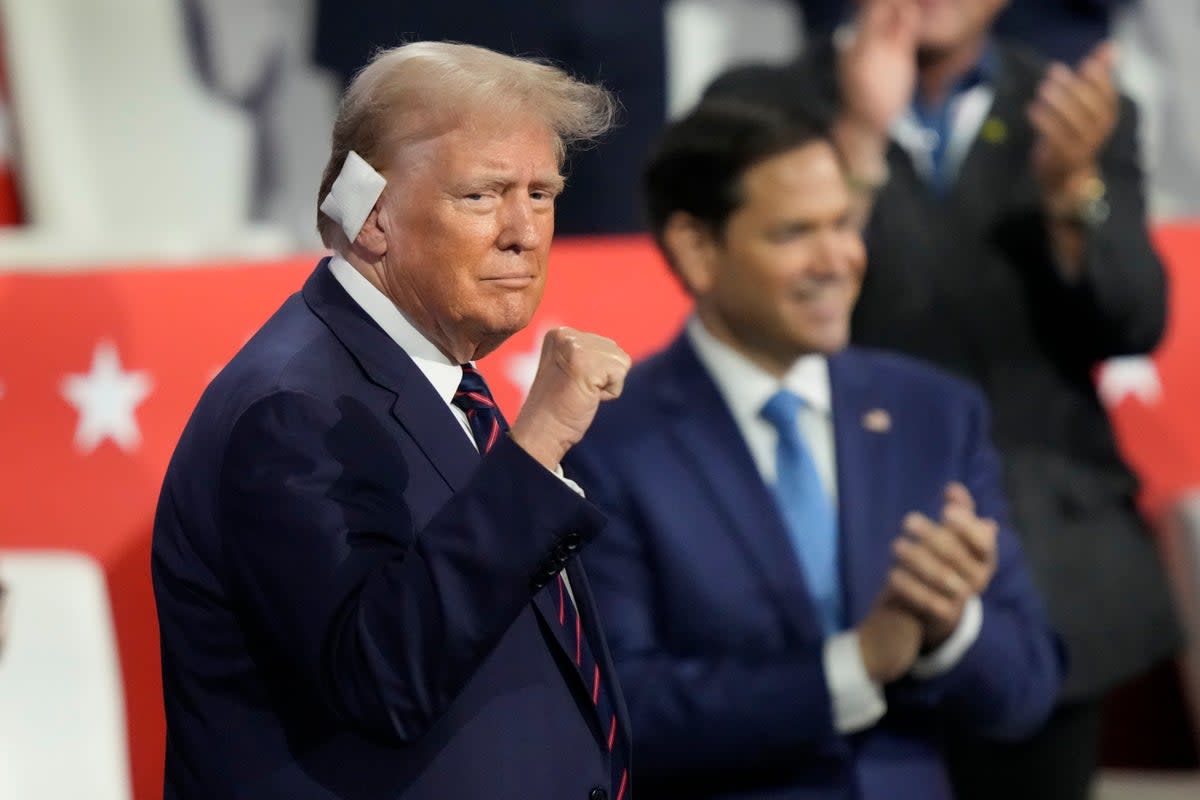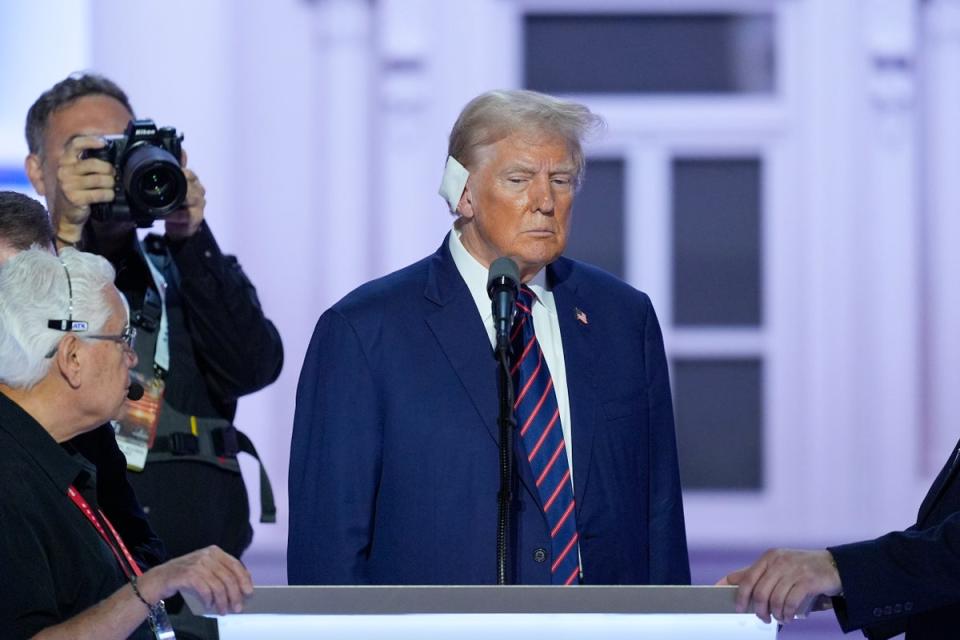Trump gloried in political violence for years. Will surviving an assassination attempt change his rhetoric?

Former president Donald Trump has promised a punishing agenda, if elected president again.
News networks should be taken off air and publishers should be thrown in jail. Top military officials committed treason, which is punishable by death. Drug offenders should be executed. Migrants are “poisoning the blood of the country,” and the “largest deportation operation in American history” could mean hundreds of thousands of people thrown in detention centers. His political opponents are “vermin” who “live within the confines of our country.”
“If I don’t get elected,” he said at a rally in Ohio in March, “it’s going to be a bloodbath for the whole… that’s going to be the least of it. It’s going to be a bloodbath for the country.”
He later told Fox News that “if you don’t use certain words, that maybe are not very nice words, nothing will happen.”
But “bad things will happen” if a state supreme court ruling in the aftermath of the 2020 election didn’t go his way. His criminal prosecution in New York would lead to “potential death and destruction,” while “terrible things are going to happen” after law enforcement agents searched his Mar-a-Lago compound.
There would be “bedlam” if he is convicted, and the country is in “big trouble” if the Supreme Court ruled against his attempts to stay on the ballot. “Does everybody understand what I’m saying?” he said in January. “I think so.”
Law enforcement officials have repeatedly warned that Trump’s rhetoric has fuelled credible threats of violence, and that Trump-allied far-right extremism poses a threat to national security. He left office in the days after a mob of his supporters stormed the Capitol to block his election loss after he failed to win at the ballot box and in court.
But after a 20-year-old gunman armed with an AR-15 fired at Trump while he was speaking at a campaign rally on July 13, grazing his ear in a near-miss shot that was inches from killing him, Trump wants to “unite” the country.
The attempt on his life has made him rethink his speech at the Republican National Convention, where he will formally accept the party’s nomination to face Joe Biden in November.
“This is a chance to bring the whole country, even the whole world, together,” he told the Washington Examiner. “The speech will be a lot different.”
Trump told the New York Post that he “prepared an extremely tough speech, really good, all about the corrupt, horrible administration,” but he “threw it away.”
His new speech will instead “try to unite our country,” he said.
In one of his first statements after his near-death experience, he wrote that “in this moment, it is more important than ever that we stand United, and show our True Character as Americans, remaining Strong and Determined, and not allowing Evil to Win.”
But the next day, he told Americans to “come together” — not against political violence, but against the “witch hunts” targeting him.
He then announced his running mate, Ohio Senator JD Vance, who baselessly asserted in the immediate aftermath of the threat to Trump’s life that Democratic “rhetoric led directly to President Trump’s attempted assassination.”
“They shot him,” he said at his first solo Trump-Vance campaign event in Milwaukee on July 17. “They literally shot him.”
A horrific attempt on Trump’s life has not erased his past comments, campaign promises and attacks against prosecutors, judges, the press, his political rivals and other Americans who do not share his views, yet Trump’s allies appear to be using the shooting as pretext to shut down criticism of Trump as an act of violence itself.
Objections to Trump’s antidemocratic platform have been waved away by his supporters as alarmist or fear-mongering, and his allies are now blaming those statements for the threat to his life.
There is no evidence that a gunman shot Trump because he was compelled by statements from President Biden, other Democrats and media figures who have warned against a second Trump term or have called him a threat to democracy.
The day after the shooting, far-right Georgia congresswoman and Trump loyalist Marjorie Taylor Greene said “the Democratic Party is flat out evil, and yesterday they tried to murder President Trump.”
Trump allies are blaming Democrats who have warned against Trump’s antidemocratic agenda “because those call-outs have educated Americans effectively to recognize the danger we are in,” according to Ruth Ben-Ghiat, an authoritarianism scholar and author of Strongman: Mussolini to the Present.
“The narrative trajectory for the fall is clear,” she said. “Trump is depicted as a force for freedom and those who document his crimes and call out his authoritarian agendas are the ‘fascists.’ They are the ones who are dangerous inciters of political violence and are to be blamed for past and any future events.”
Republicans are aiming to “discredit the entire argument that Trump will govern as an autocrat, and sets up a justification to lock up critics if Trump wins the election on grounds of ‘public safety,’” according to Ben-Ghiat.

Trump has repeatedly made promises to “unify” the country in his campaigns, making sweeping and vague assurances that he will bring “peace” to the world while revealing and exploiting fractures in American society.
“The real threat is not from the radical right. The real threat is from the radical left,” he said during a campaign rally in November. “It’s growing every day, every single day. The threat from outside forces is far less sinister, dangerous and grave than the threat from within. Our threat is from within.”
He tells his supporters that there “won’t be a country anymore” if he loses the 2024 election.
Three months before he was shot, asked whether he believes there’s a threat of political violence if he doesn’t win, he told Time magazine: I think we’re going to win. And if we don’t win, you know, it depends.”
But Trump’s campaign now thinks he has turned a corner, at least for now.
“This is obviously an opportunity to bring our country together. But let’s not forget we’re in the middle of a campaign,” Trump campaign adviser Chris LaCivita said at an event at Georgetown on July 16.
“Our focus is very much on putting everything back squarely on the issues that are hurting everyday Americans and providing them an answer to those,” he said.
“Listen, I think it lasts,” Donald Trump Jr. said during an interview with Axios at the RNC on July 16.
“There are events that change you for a couple minutes, and there’s events that change you permanently,” he said.
“Now, again, it’s Trump, so you’re still gonna be reactionary,” he added. “He’s going to do his best to moderate that where he needs to be. … He’s going to be tough when he has to be. We’ve seen that, he’s never gonna change. But I think there will be something. I think these are momentous occasions that change people permanently.
